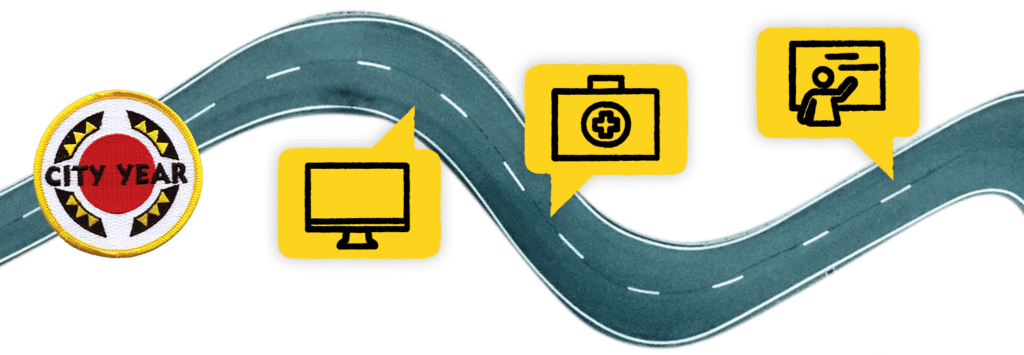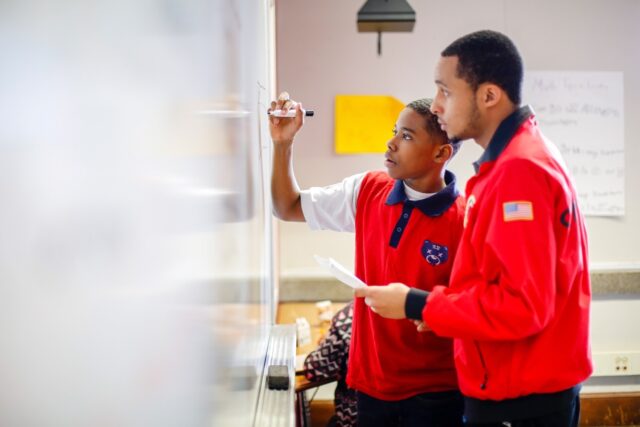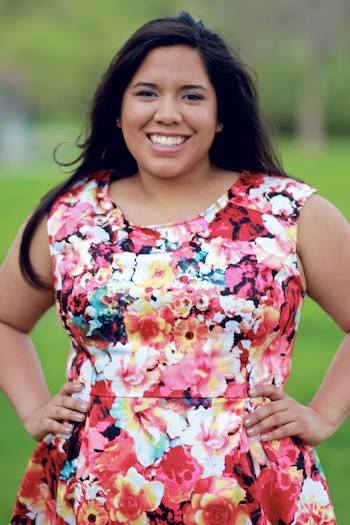City Year is nurturing diverse future teachers

City Year’s Teacher Pathway’s Strategy Team recently shared highlights of our Teacher Pathways initiatives at the Aurora Symposium, a leading education conference. Identifying and supporting AmeriCorps members who are interested in teaching has become part of who we are and what we do. We asked Jeanette Rojas, City Year’s School Design Director, who oversees this work, to tell us more about this work and an opportunity to nominate an AmeriCorps member or an alum for a teaching fellowship.
The conversation below has been edited and condensed for clarity.
City Year cultivates and nurtures the next generation of teachers
Aisha Folkes (AF): City Year is known as a service provider in public schools, recruiting and training thousands of student success coaches to support student academic, social and emotional growth. Why has City Year decided to invest its resource and attention in cultivating and nurturing the next generation of teachers?
Jeanette Rojas (JR): I think it starts with our incredible alumni. They really set the trends based on their career interests and all they go on to accomplish. City Year has a saying, a PITW (Putting Idealism to Work), that says, “I’m ready, choose me!” Over the years, we saw City Year alums become interested in teaching either before or during their year of service and then go on to pursue a career through community partners, either a national or local program. Our alumni really modeled the way for us on this idea that young adults who serve with City Year develop the skillsets and mindsets that make phenomenal teachers.
Thanks to biannual all-alumni surveys we began conducting in 2018, we’ve learned that more than half of our alums currently work in the education sector—as teachers, administrators, guidance counselors or at education and youth-focused nonprofits. We’re proud of all of our alumni who are leading and serving across a wide range of professions, and it’s especially inspiring to know that so many choose to become teachers or work in education policy.
Across the network, we’ve seen that our school partners need diverse and committed teachers. At the same time, we’ve seen City Year alums who become teachers be more diverse and remain in the profession longer than the national averages. We’re excited that City Year is powerfully positioned to tackle these challenges.
- 86% of City Year alums who become teachers are still teaching after three years
- 66% of City Year alumni teachers have taught more than five years
- 23% of City Year alumni teachers continue to teach for 10 years or more
Those numbers alone show how committed our City Year alums are to the field of education.

City Year Teacher Pathways
AF: That’s incredible! For someone who doesn’t know anything about City Year’s teacher pathway work, how would you describe it?
JR: The main goal of City Year’s Teacher Pathway Strategy is to meet the growing social, emotional and academic demands that students face, particularly those from systemically underserved and under-resourced communities. It’s important for all of us to build new pathways that decrease the barriers that exist in recruiting and developing a diverse and culturally competent teaching workforce—teachers who are committed to advancing educational equity. Strengthening teacher pathways that begin with a year’s pre-service classroom experience as a City Year AmeriCorps member is critical to meeting this goal.
To that end, our teacher pathway work consists of three levers I like to describe as a pyramid. We see our largest focus on the baseline career services we provide all AmeriCorps members. All AmeriCorps members develop a post-service plan alongside their managers and those who express interest in a teaching career can receive site-based career exploration. Seven of our sites have launched career-based affinity groups where AmeriCorps members meet monthly to explore different industries including education, through tailored mentoring and coaching AmeriCorps members learn how to enter the teaching field in the education landscape of their local site community. Depending on the city and state, entering the field of teaching, including licensure, schooling requirements and processes, will look different. We’re excited to continue to expand our teaching affinity groups across the network while keeping them locally relevant.
Our next initiative is our external AmeriCorps-to-teacher pipelines. Our sites partner with local teacher preparation programs as well as our national partnerships with programs such as Teach for America, Urban Teachers, and local colleges/universities that recruit from our corps. Through these partnerships, AmeriCorps members get exposure and access to teacher pipelines.
Our internal lever—teaching fellowships—is currently our smallest and most concentrated. We have two teaching fellowships in City Year Boston and City Year Denver. Our AmeriCorps members return for a second year of service and are concurrently enrolled in a graduate program at UMass Boston or Regis University to obtain their master’s in education and their teaching license. We plan to expand the work to City Year Providence for the 2022-2023 school year.
“Young adults who serve with City Year develop the beginning skillsets and mindsets that make phenomenal teachers.”
– Jeanette Rojas, City Year’s School Design Director
AF: What sets City Year’s Teacher Pathway efforts apart from other programs?
JR: When we look at the national landscape of how we prepare teachers, City Year is uniquely providing pre-service, pre-teacher pathways. The young adults who serve with us as AmeriCorps members contribute more than 1,700 hours of service in the schoolhouse through our Whole School, Whole Child® model, which creates space and opportunity for AmeriCorps members to experience what working in a school is like this work and want to become teachers.
Some young adults who join City Year might come in thinking they want to become teachers and their year of service convinces them their future is not in teaching. We think that is a win, too, as teacher retention can be such a challenge for our school partners. Providing an opportunity for passionate and talented young adults to explore the education field early on can help them ultimately find the right career for them. Our alumni who don’t enter the education sector help to promote social justice and advocate educational equity wherever they may live and work, making them critical allies in City Year’s mission.
The thing that truly sets our teacher pathway work apart from other programs and approaches is the full-time pre-service component in schools. Before they are committing to a teacher-training program, they’re flirting with a career in education. Corps members are curious about teaching and get the in-classroom experience before they commit.
As educators can all agree, October-to-November is the hardest stretch in teaching across the country. It’s the longest you go without a break, it’s right before the holiday season, and it’s after the first couple of days of rituals and routines– it’s when learning happens.
Our City Year AmeriCorps members experience all the highs and lows. They see how hard those last few minutes before lunch are, before that bell rings, and they get to make a conscious decision as to whether they want to commit to a career of teaching. They see how hard COVID-19 has been for our students and the disruption of learning. And they get to decide that despite all the challenges, they want to be a part of the solution.
Career development with City Year
AF: What’s next for teacher pathways?
JR: While we have established our baseline career development supports and built some mature external teacher pathways with partners over the last five years, we’re still in the early stages of unlocking more career coaching opportunities through staff and mentors, expanding teacher pipelines in collaboration with our school districts, and piloting the internal teacher fellowship. As we continue to build, the hope is that each three of these levers see expansion and growth across the network.
Specifically, in terms of our teacher fellowship work, we’re continuing to build out a rich curriculum that develops culturally competent educators who are ready and able to do anti-racism work. This year we’re hosting a ‘joy and belonging’ seminar as our first step to exploring this—giving our fellows the knowledge and tools to think beyond traditional classroom management and create truly engaging and welcoming learning environments where all students feel valued and safe. My hope is that one day this seminar could become an antiracism micro-credential for our future educators.
We’d like to tackle the inclusion of AmeriCorps members who have graduated high school and have completed little-to-no college. We’re exploring the question: what could undergraduate teacher pathways look like? We’re talking to a few really innovative universities right now, so stay tuned to see what we begin to offer at a few of our sites next. After all, we’re not building equity if we’re only offering opportunities to young adults who are at the graduate school level.
AF: Is there a cost-benefit to the City Year Teaching Fellowship?
JR: For sure! One of the goals of City Year’s Teaching Fellowships is to remove barriers to entering the teaching field through our partnerships with institutions of higher education and make the process more streamlined and more affordable. In addition to the Segal Education Award AmeriCorps members are eligible to receive after they complete their service, Teaching Fellows can earn a graduate degree, teaching license, and living stipend while paying considerably less for their teacher preparation program. On average, we’re seeing our Teaching Fellows pay about a third of the cost after the Segal AmeriCorps Educational Award, which is something we’re really proud of!
“The main goal of City Year’s Teacher Pathway Strategy is to meet the growing social, emotional and academic demands that students face, particularly those from systemically underserved and under-resourced communities.”
– Jeanette Rojas, City Year’s School Design Director
AF: For current corps or alums interested in the Denver and Boston teaching fellowships, what’s the process to apply?
JR: The baseline requirements are: a bachelor’s degree from a regionally accredited university with an average undergraduate GPA of 3.0 or above; at least one year of City Year service; and U.S. citizenship or permanent residence.
Depending on specific state requirements, a bachelor’s degree may need to align with content area for licensure. For example, if an AmeriCorps member is interested in earning a secondary science teaching license, a bachelor’s degree in a science related field may be required.
All who are interested are required to apply as a Returning AmeriCorps Member (RACM). We recommend AmeriCorps members and alumni ask their Impact Manager to nominate them for our Teaching Fellowship. While nominations are not required, they do give applicants an advantage throughout the process. We accept nominations from November 8th to December 17th, 2021.
To become a Teaching Fellow, applicants must be admitted by both City Year and the appropriate licensing program. Applicants will first complete the City Year Returning AmeriCorps application, which opens Wednesday, Dec. 1 and is due by Friday, Jan. 21, 2022, followed by an additional application with our licensing partner.

Jeanette Rojas, City Year’s School Design Director
Related stories
Over the last few months, City Year Memphis and their local Starbucks partners—along with several other community organizations, businesses and...
Read more about Creating hope and opportunity in Memphis through partnershipsIn recognition of Financial Literacy Month, City Year AmeriCorps members are exploring the importance of financial literacy for young people’s...
Read more about Understanding the importance of equitable access to financial literacyIf you speak with an HBCU alum about their experience, you’ll quickly learn that service to the community is one...
Read more about Diversity, leadership and community: reflections of an HBCU alumDo you know about the vibrant city of Kansas City and the incredible opportunities it offers to City Year AmeriCorps...
Read more about Seven reasons to serve with City Year Kansas City















